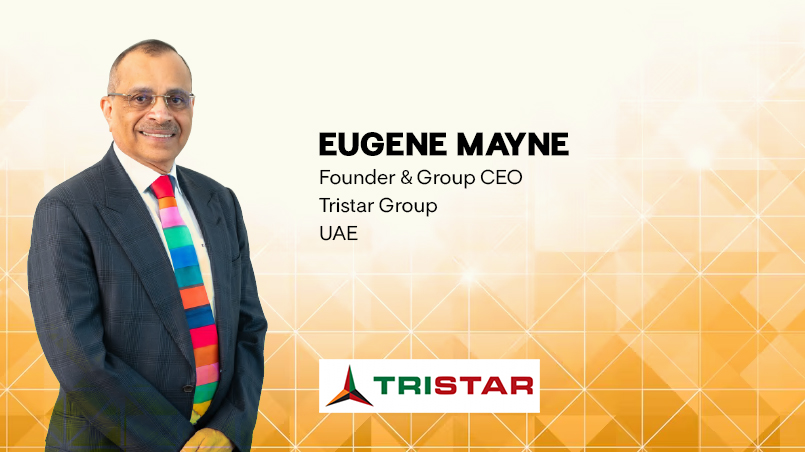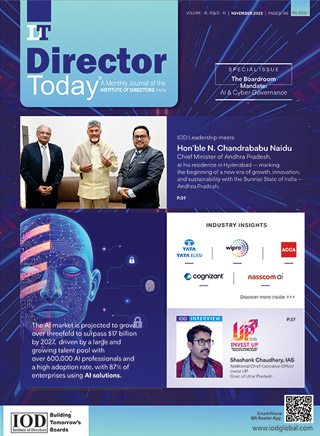IOD Interview - Staying Ahead of the Curve: Tristar's Pioneering Leadership in Sustainability and Climate Innovation

Q. 1 Tristar launched its first GHG report ahead of the UAE government's emissions reduction law implementation. How do you keep informed and agile to align Tristar's governance framework with evolving sustainability expectations?
Tristar has identified environmental stewardship and carbon neutrality as primary business objectives and we continue to implement associated measures across operations, some of which address anticipated regulations or precede industry standards.
While reporting is vital to stay in compliance with laws and regulations and these vary vastly across business sectors and geographies regular evaluations help us develop strategies that can reduce our carbon footprint, minimise or mitigate risks, and gain competitive advantage in markets that are increasingly focused on climate action. This emphasis on reliable reporting enables us to integrate sustainability into strategy, operations, and decisionmaking, and also align them with various regulations and frameworks, while advancing the net zero mission.
We applaud the new UAE Federal Decree-Law No. (11) of 2024 on the Reduction of Climate Change Effects, and welcomed it with our first Greenhouse Gas Report (GHG) as an assessment for the year 2024, alongside the 13th edition of our annual Sustainability Report.

Q. 2 How do you envision Tristar continuing to drive scale its decarbonisation efforts to transform supply chains into more sustainable, resilient, and lowcarbon networks, especially in a sector known as hard to abate? Do you have a roadmap for your plans to achieve the target of net-zero emissions by 2050?
Tristar Group first launched its internal climate target setting initiative, aligned with Science, in March 2024, by applying frameworks based on the Science Based Targets initiative (SBTi) and the Transition Pathway Initiative (TPI). This exercise sets targets and priorities for climate goals across all operations to shape our emissions reduction roadmap.
Around the world, carbon-related legislation and regulations are increasing and with it, the demand for carbon accounting. As a group that operates many verticals of business in multiple countries, staying ahead of the curve is critical for continued success. The regulatory landscape is defined by innumerable changes and variables, and it is vital we espouse both short- and long-term strategies for interpreting different outlooks. Our teams closely monitor emerging technologies and regulatory directives in tandem, to gain market insights and support timely adoption. Staying in sync with industry developments also enables innovation in the services we offer customers.
We believe a successful approach to sustainability is a balanced combination of emotional, rational, and artificial intelligence - or EI, RI and AI.
We have embraced a mixed approach of new and existing technologies based on energy efficiencies and green fuels for our land and maritime transportation units, and fuel and fuel farm operations. The goal is to achieve sustainability outcomes that are robust, human-centred, and future-proof.

Our approach since inception has been to place purpose and profit in equal measure to transcend profitmaking by linking actions to larger societal or environmental goals.
Q. 3 Tristar's 'Safety at Sea' conference, which was once a local event, has now gained significant global attention. You have also actively championed community initiatives in education, financial literacy, gender equality and sports around the world. How do you uphold and foster these values of care, social responsibility and governance when implementing sensitive but impactful CSR programmes while balancing the operational demands of a rapidly growing global company?
In recent years, our outreach programmes have veered towards corporate social justice a reframing of CSR that focusses on the lived experiences of people or places that are disadvantaged in society and supports special groups that need care or aid. These relationships are regulated by trust and understanding, and the explicit goal is to do good by them.
We are committed to a strategic evaluation of issues that lie at the nexus of our corporate values and the unmet needs of diverse stakeholders, and to address them effectively. Whether it is the safety of international maritime workers, the skills training of African boys and girls or the cleaning of beaches in the UAE, the goal is to contribute substantively to economic and social development while responsibly upholding our commitments to community.
Q. 4 As the UAE accelerates both, its AI and sustainability agendas, and recognising the Dh170 billion AI economy as a source of new value creation, how is Tristar innovating or merging AI expertise with sustainability acumen to reduce both costs and emissions?
We believe a successful approach to sustainability is a balanced combination of emotional, rational, and artificial intelligence - or EI, RI and AI.
We have been actively embedding AI into our operations to drive efficiency and boost safety and sustainability. A new data reporting and integrated chat system allows faster access to operational insights; AI-powered safety systems in our warehouses can detect risks in real time; various automated data capture tools such as AI-driven odometer and pump readings have reduced manual logging errors and continues to improve accuracy. Our people are being prepared for the future, especially through upskilling programmes that ensure they are not only aware but ready to adopt AI tools.
Running parallel to this are tangible measures to improve efficiency, reduce emissions and boost sustainable operations. For instance, significant steps to scale up the use of biofuel in our road fleet saw conventional fuels being replaced by 2.13 million litres of 5% biodiesel last year. In other examples, we are on track to replace High Sulphur Fuel Oils (HSFO) with lower versions, per the sulphur emissions standards of the International Maritime Organisation (IMO), and our hybrid electric barge, which will soon be operated in Fujairah, will lower emissions by half when compared to a conventional barge.

Q. 5 Since founding Tristar, growing it into a global presence of more than 30 countries is a remarkable achievement. How do you engage with key stakeholders including board members, employees, and external partners to ensure transparency, accountability, and strong governance throughout Tristar's operations? Additionally, what is your vision and strategic plans for further expansion and continued success?
Our approach since inception has been to place purpose and profit in equal measure to transcend profitmaking by linking actions to larger societal or environmental goals. The ethical principles embedded across our global operations enable us to be viewed dependably and favourably as a business for purpose.
Tristar's 'Business for Purpose' framework is designed to inspire all our stakeholders - from shareholders, leadership, and employees to associates and suppliers - to operate with a shared sense of purpose that goes beyond financial gains and supports the 17 UN Sustainable Development Goals. Incorporating this into everyday processes such as training, reporting, feedback mechanisms, and reputation and crisis management protocols reinforces our commitment, alongside regular interactions with our stakeholder universe.
Our Sustainability Stakeholders' Workshop on materiality issues, ESG goals and future programmes sees widespread participation from customers, suppliers, corporate partners, media partners, industry associations and NGOs. Likewise, we host an annual Global Safety Day and Quarterly Safety Meetings with the inclusion and participation of several external stakeholders.
Developing new skill sets, adopting emerging technologies, and increasing the efficiency of existing infrastructure are integral part of our growth strategy.
Author

Institute of Directors India
Bringing a Silent Revolution through the Boardroom
Institute of Directors (IOD) is an apex national association of Corporate Directors under the India's 'Societies Registration Act XXI of 1860'. Currently it is associated with over 31,000 senior executives from Govt, PSU and Private organizations of India and abroad.
Owned by: Institute of Directors, India
Disclaimer: The opinions expressed in the articles/ stories are the personal opinions of the author. IOD/ Editor is not responsible for the accuracy, completeness, suitability, or validity of any information in those articles. The information, facts or opinions expressed in the articles/ speeches do not reflect the views of IOD/ Editor and IOD/ Editor does not assume any responsibility or liability for the same.

 Quick Links
Quick Links
 Connect us
Connect us




 Back to Home
Back to Home






























